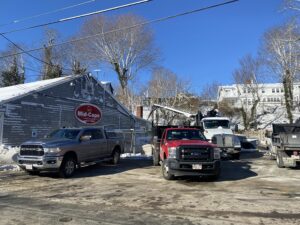WELLFLEET — Cleanup is underway for an estimated 250 gallons of heating oil that was discovered to have leaked into the ground at Mid-Cape Home Centers on Commercial Street on Jan. 25. The extent of the spill appears limited to the property itself, according to Edmund Coletta, director of public affairs for the Mass. Dept. of Environmental Protection (DEP).

The above-ground oil tank at the hardware store’s historic district location — just across the street from Duck Creek — was found empty by an employee, according to the initial DEP report. The tank, which is in a tight space behind the building, had leaked oil out of a hole in its bottom, the report said.
The Wellfleet Fire Dept. and DEP were notified that day, and authorities covered the area with a tarp to prevent rain from pushing the oil deeper into the soil, Coletta wrote in an email to the Independent.
The oil has “not gone anywhere near Mid-Cape Home Centers’ property limit,” said Susan Jason, the licensed site professional for the cleanup and a senior project manager at the environmental engineering and design consulting company Weston & Sampson. The company has been performing soil and groundwater testing, which so far confirms that the spread is limited, Jason said.
Jason also noted on Feb. 23 in a “release amendment form” — a form used to log the test results with the state — that no oil had been seen in a monitoring well beneath the building, indicating that the oil had not traveled that far. A visual inspection of Duck Creek across Commercial Street from the site of the spill “did not reveal the presence of any oil sheens,” Jason wrote.
Frank Corp. Environmental Services, a New Bedford-based environmental consulting and emergency response company that was hired to conduct the cleanup, installed six additional monitoring wells to sample groundwater for contaminants.
Additionally, drinking water from a well on the property is being tested for contamination, Jason said. The samples were collected last week, she said, and the team is awaiting the results.
Heith Martinez, Wellfleet’s health agent, noted that preliminary observations indicate that the groundwater beneath Mid-Cape Home Centers does not flow to Duck Creek but instead flows along Commercial Street parallel to the shoreline toward the pier. This pattern, he said, should mean that the oil is unlikely to end up in the tidal creek.
Frank Corp. has also identified the locations of private wells in the area so that they can test their water if further spread occurs, Coletta said. Currently, “there is no indication of private well impact whatsoever,” Jason said.
The cleanup process was initially inhibited by the location of the spill, according to Coletta. The tank is in a narrow space between the building and a retaining wall, so while excavation was approved on Jan. 26, it could not begin for three days because a structural engineer needed to “pin” the retaining wall to prevent it from collapsing. Another more complex pinning process was performed for the building using large timbers, Coletta wrote, which delayed soil removal from beneath the building until Feb. 19.
Martinez said that Frank Corp. employees were able to dig a well adjacent to the tank to begin pumping out contaminated groundwater on Jan. 26. This process, he said, “slows or almost stops the plume movement,” mitigating the spread of the oil.
The tank on the property had only one wall, which does not violate EPA and state regulations. The only above-ground storage tanks that require double walls are those that contain more than 10,000 gallons of liquid other than water, a regulation that was put in place in Massachusetts after the Great Molasses Flood in Boston killed 21 people in January 1919, according to the Mass. Executive Office of Public Safety and Security.
As of Feb. 16, Coletta wrote, 30 to 35 cubic yards of oily soil had been removed from the property.
In a letter on the Mass. Energy and Environmental Affairs website, Jason wrote to the environmental and waste management company Clean Earth/ESMI to request approval to move 150 tons of contaminated soil to its recycling center in Loudon, N.H., where the soil would be treated with heat to remove harmful contaminants. Jason also submitted a bill of lading that indicated that contaminated groundwater will be transported to a treatment plant in Taunton run by commercial wastewater treatment and recycling company Global Cycle.
Jack Stevenson, president of Mid-Cape Home Centers, is strictly liable for cleaning up the spill, according to the notice of responsibility that the DEP sent him on Jan. 29. Martinez noted in an email that Stevenson has been “very cooperative.” He also wrote that he has been impressed with the “quick response” by the team of environmental engineers onsite. He credited Jason and Frank Corp. with preventing further spread of the oil.
Stevenson released a statement indicating that his company was working to “address and remediate the situation as quickly as possible.” Coletta and Jason both said they were unsure how long the cleanup process would take. A full report of the actions taken to mitigate and remediate the spill is due on March 25, and the notice of responsibility indicated that all waste must be removed by May 24.
